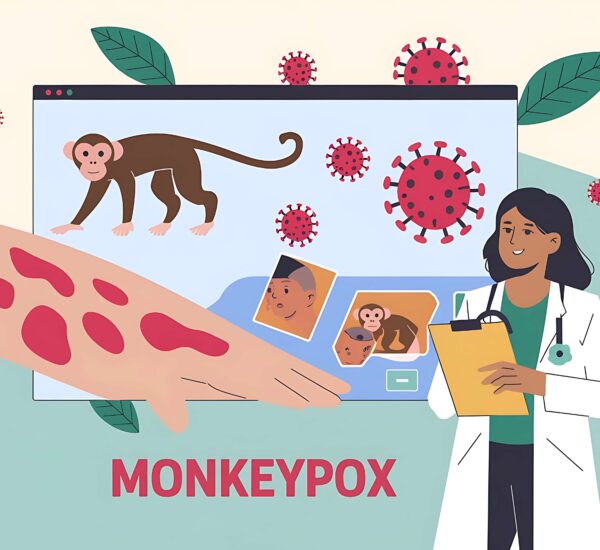Monkeypox virus is a viral infection that must be managed as soon as the symptoms are present. Doing so allows you to take better care of your health and prevents the spread of the condition. Unfortunately, while some cases can be resolved on their own, there are certain instances where hospitalization is a must. In that case, figuring out the right time for Mpox hospitalization is a crucial aspect that you must harness to ensure proper management of the infectious disease.
In this blog, we’ll provide the necessary guide to help you navigate your way towards wellness. Determine the factors indicating the right time to seek Mpox hospitalization to manage Mpox symptoms properly. Let’s begin!
Threat to Health: Global Outbreak of Mpox

Mpox is one of the severe diseases that had a global outbreak after COVID-19. Because of that, mass terror will always be present, considering the risk of exposure present. However, one thing that people must understand is they can be safe from contracting the disease if they know the crucial details of Mpox.
For instance, Mpox is an infectious disease that originated in endemic areas like Central and West Africa, and the highest number of cases of Mpox is in the Democratic Republic of the Congo. However, in 2022, a global Mpox outbreak occurred affecting several countries including the United States, Thailand, and Philippines.
This global outbreak of Mpox posed a significant threat to public health, necessitating a strategic approach to hospital care for severe cases. Recognizing the urgency of seeking Mpox hospitalization can make a crucial difference in effectively managing symptoms and preventing the further spread of the virus.
People at Higher Risk of More Serious Mpox Disease
Individual risk assessment is an important factor for these groups to practice when there is an outbreak of Mpox. With their weakened immune system, viral infections can easily penetrate their health, which leads to them being infected.
Here are the common people to be infected with severe Mpox:
Immunocompromised Individuals
People with weakened immune systems, such as those with HIV/AIDS, cancer patients undergoing chemotherapy, or organ transplant recipients, are at a higher risk of developing severe Mpox. Their bodies are less equipped to fight off the virus, making them vulnerable to complications like pneumonia, secondary bacterial infections, and delayed healing of skin lesions.
Hospitalization for immunocompromised individuals ensures they receive antiviral treatments, immune system support, and careful monitoring to prevent life-threatening complications.
Pregnant Women
Pregnant women face a unique set of risks when it comes to Mpox. The virus may affect both the mother and the developing fetus, potentially leading to complications such as miscarriage or preterm birth. Pregnant women with Mpox should seek medical care early, as they may require specialized monitoring and treatment to protect their health and that of their baby.
Children and Elderly Patients
Both children and the elderly are more likely to experience severe Mpox symptoms due to their less robust immune systems. Children, especially those under five, may develop complications such as dehydration, respiratory distress, or secondary bacterial infections. Elderly patients are also more vulnerable to severe outcomes, including pneumonia and other complications related to Mpox.
In both cases, hospitalization allows for close monitoring and intervention to prevent the infection from worsening.
Understanding When Mpox Hospitalization is Necessary

Most individuals who contract Mpox will experience mild symptoms that can be treated at home. However, certain conditions or symptoms signal the need for hospitalization to avoid life-threatening complications.
Persistent High Fever
One of the common reasons for considering Mpox hospitalization is constant high body temperature. While fever is one of the usual symptoms of Mpox, it commonly resolves on its own. If it remains unresponsive for more than 3 days, even with medications for fever involved, it is a possible sign of Mpox disease severity.
Prolonged high fever can lead to dehydration, neurological issues, or signal a secondary bacterial infection, necessitating medical intervention. In that case, Mpox hospitalization is necessary for the treatment of Mpox and to manage this severe complication.
Severe Skin Lesions and Secondary Infections
Another reason for seeking medical help for Mpox is the effect of the symptoms to the skin. Mpox can lead to blisters and skin lesions throughout the 2-4 weeks. Skin lesions go through several stages such as red spots to fluid-filled blisters, and eventually scab over.
Most lesions heal without complications, but severe or infected lesions require hospital care. Signs of secondary bacterial infections include:
- Increased redness and swelling around the lesions
- Pus or foul-smelling discharge
- Pain and warmth at the injection site
Respiratory Issues
Although Mpox primarily affects the skin, the virus can also impact the respiratory system. Individuals who experience difficulty breathing, persistent coughing, chest pain, or wheezing need urgent medical attention. Mpox can lead to pneumonia, especially in high-risk groups, such as those with weakened immune systems or pre-existing lung conditions.
In severe cases, patients may require oxygen therapy or ventilation to support their breathing. Early intervention is crucial to prevent the infection from worsening.
Neurological Symptoms
In rare cases, Mpox can cause inflammation in the brain or spinal cord, leading to severe neurological symptoms. These symptoms include:
- Confusion or disorientation
- Seizures
- Muscle weakness
- Vision problems
- Intense headaches
Neurological complications are serious and require immediate hospitalization, as they can progress rapidly without proper medical care.
Advanced HIV infection
One of the transmission methods of Mpox is sexual activity. Unfortunately, that’s not the only viral disease involved as HIV infection can also be rooted in bodily fluids. In short, when a patient with a positive HIV status becomes exposed to Mpox, expect severe complications such as advanced HIV infection to occur.
Individuals with advanced HIV are more susceptible to severe Mpox symptoms and complications. Hospitalization is often necessary to manage both the Mpox infection and the underlying HIV condition effectively.
Hospital Care for Mpox: What to Expect

Seeking Mpox hospitalization is not usually needed when there are only mild symptoms present. However, if the complications mentioned above become apparent, it’s best to trust a healthcare provider to ensure your safety. So, if you or a loved one requires hospitalization for severe Mpox, knowing what to expect can help alleviate stress and ensure timely care.
Diagnosis and Medical Assessment
Upon arrival at the hospital, healthcare professionals will conduct a thorough assessment, including a physical examination and a review of your symptoms. In most cases, the diagnosis will be based on the appearance of the rash and other Mpox symptoms. However, additional tests, such as PCR testing, blood work, or lesion swabs, may be conducted to confirm the diagnosis and rule out other infections.
The hospital team will also check for signs of complications, such as secondary bacterial infections or respiratory issues, to determine the severity of your condition.
Admitting of Patient and Length of Stay
If there’s a life threat detected, the doctor will highly recommend you to get confined for a thorough observation. The length of hospital stay for Mpox patients varies depending on the severity of the infection and the presence of complications. Most patients will remain hospitalized until their symptoms have improved, and they are no longer considered contagious. For individuals with weakened immune systems or other high-risk factors, the hospital stay may be extended to ensure full recovery and prevent relapse.
Treatment Options for Severe Mpox
While there is no specific antiviral treatment for Mpox, hospital care focuses on managing symptoms and preventing complications. The treatment plan will depend on the severity of the symptoms and any underlying health conditions.
Common treatments include:
- Antiviral Medications: Tecovirimat (TPOXX) may be prescribed for patients with severe Mpox or those at risk of complications. This medication can help reduce the severity and duration of the infection.
- Antibiotics: If a bacterial infection is present, antibiotics will be administered to prevent further complications, such as sepsis or cellulitis.
- Oxygen Therapy: Patients experiencing respiratory distress may require oxygen therapy to ensure adequate oxygen levels in the body. In severe cases, mechanical ventilation may be needed.
- Intravenous (IV) Fluids: Dehydration is a common complication of Mpox, especially for patients experiencing vomiting or diarrhea. IV fluids will be provided to maintain hydration and electrolyte balance.
Isolation and Infection Control
Because Mpox is a contagious virus, patients will be placed in isolation to prevent the spread of the infection within the hospital. Hospital staff will take precautions such as wearing personal protective equipment (PPE) and following strict hygiene protocols when caring for Mpox patients.
Visitors may be restricted, and communication with family members might take place through phone or video calls to reduce the risk of transmission.
Hospital Locations to Visit for Mpox Hospitalization
Due to the spread of Mpox, the DOH has ensured proper care and training among health workers are plausible. Thus, ensuring patients get the care needed no matter where they are. Here are the common locations for seeking help with Mpox:
- barangay health centers
- public and private hospitals
- local clinics
If you need more sources for seeking a health facility, you can check out our list of hospitals on NowServing!
Frequently Asked Questions
How long does hospitalization for Mpox usually last?
The length of hospitalization varies depending on the severity of the symptoms and the presence of complications. Most patients remain hospitalized until their symptoms have improved and they are no longer contagious. Ensure your health by managing Mpox complications with a help of health experts.
Does supportive care for mental health include managing Mpox?
Yes, receiving medical advice for mental health is an integral part of managing Mpox. Patients may experience anxiety, fear, or stress during hospitalization, and services such as counseling or therapy can be provided to support their mental well-being. It is essential to address the emotional aspect along with the physical symptoms to ensure a holistic recovery for patients affected by Mpox.
Does my HMO cover the Mpox hospitalization fee?
Health insurance is applicable for medical care needs, and that involves the hospitalization fee. However, not all HMO plans can accommodate the full fee for the length of stay as it will depend on the coverage acquired. It’s best to communicate with your provider to clarify your current HMO plan so you can use them in case of hospitalization.
Conclusion
For most people, Mpox is a mild illness that can be managed at home. However, Mpox hospitalization is necessary for individuals experiencing severe symptoms or those who belong to high-risk groups. Recognizing the need to seek experts’ help can make a significant difference in preventing life-threatening complications.
If you or a loved one experiences any of the red flags mentioned, seek medical help promptly to safeguard your health. Book an online consultation or visit an infectious disease doctor today!
Mpox Hospitalization Quiz
Test your knowledge about severe mpox cases



